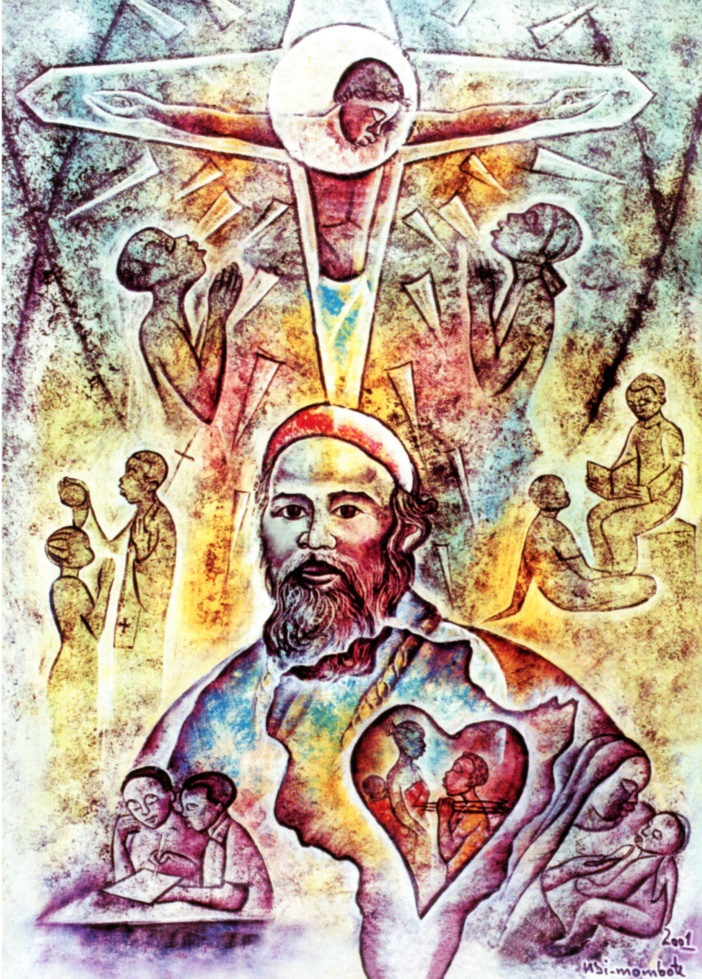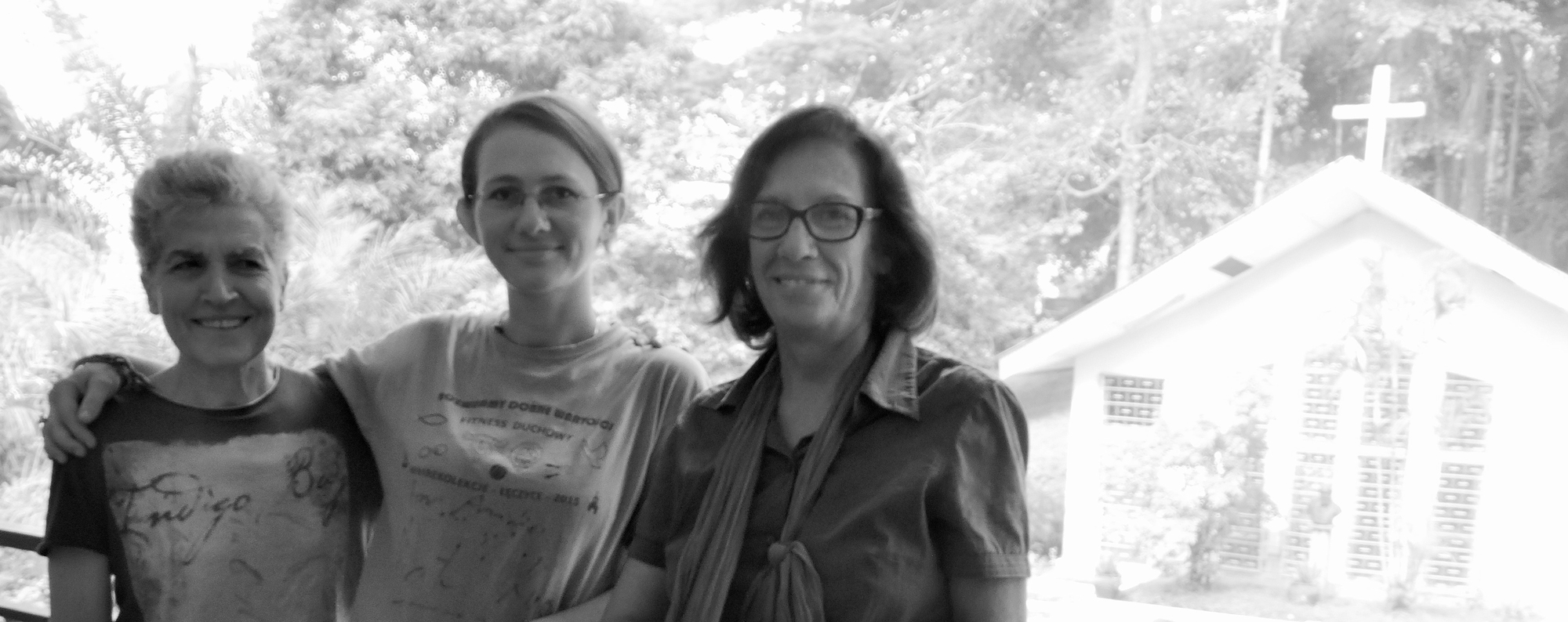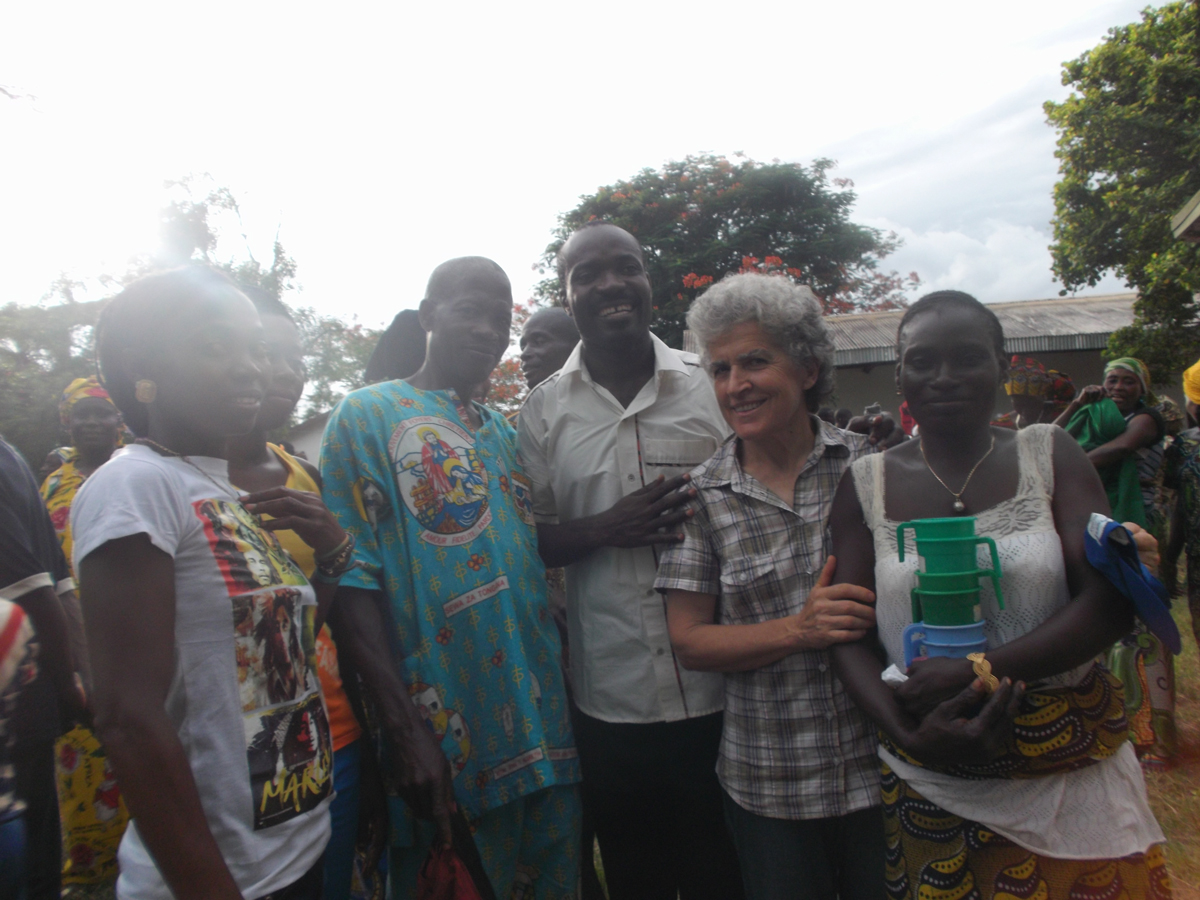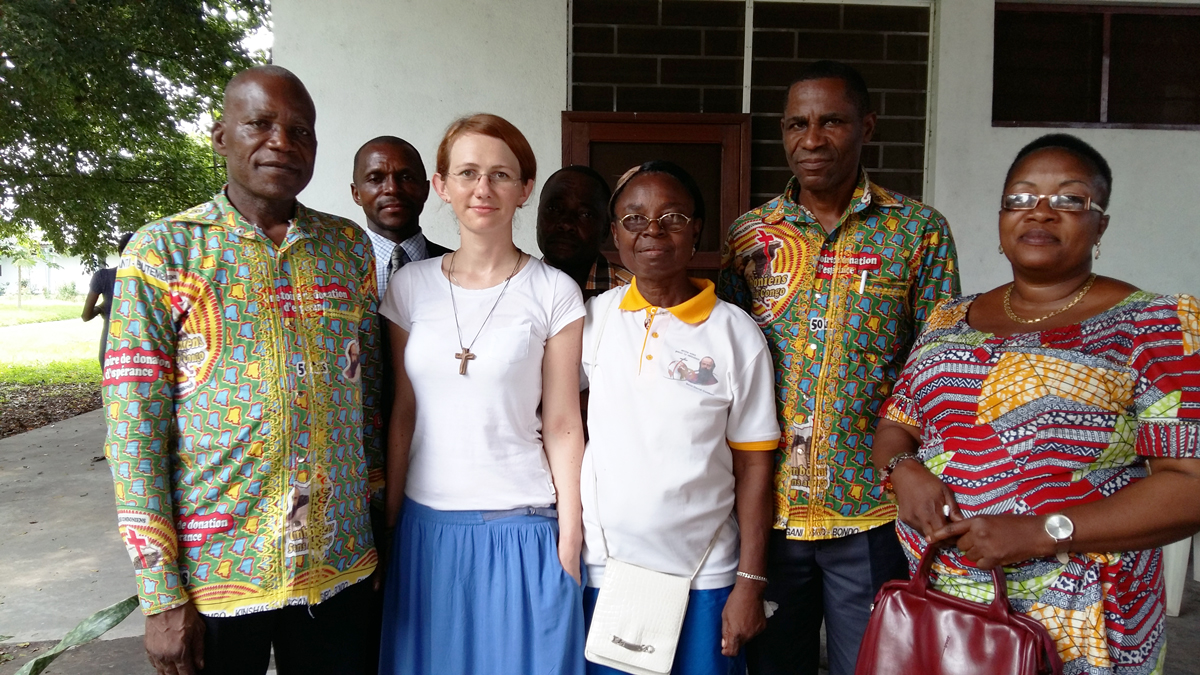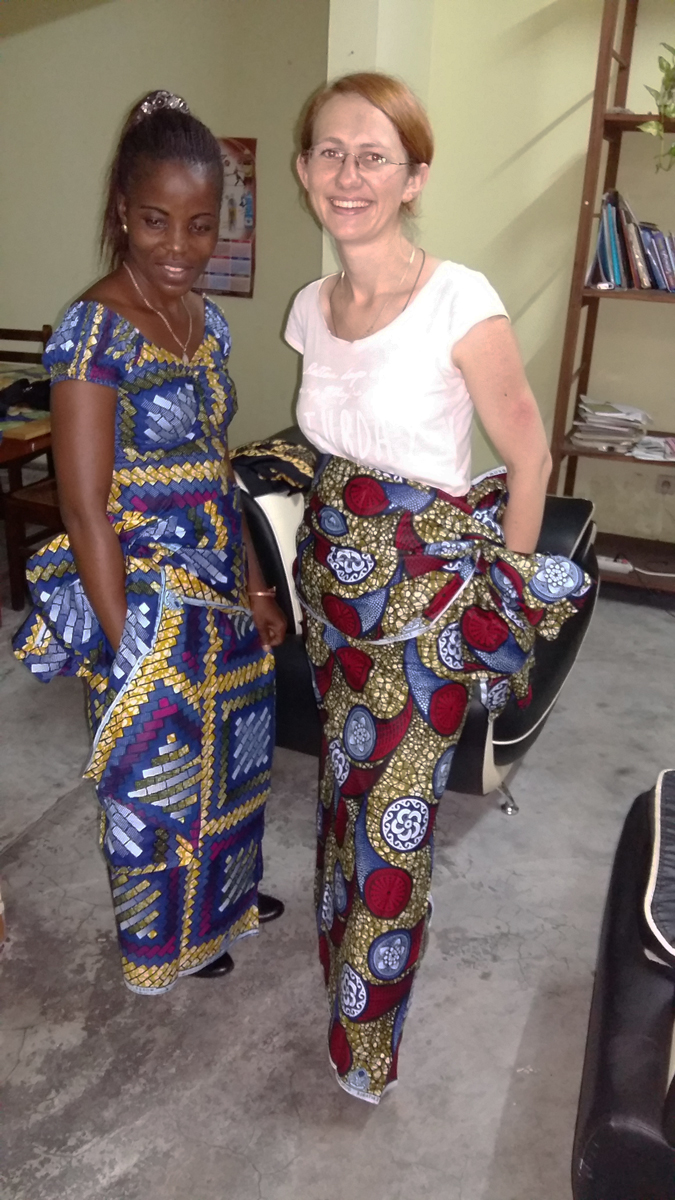 Hi Anna. Could you introduce yourself to the audience? Tell us about your family.Good morning father. Good morning everyone.My name is Anna Obyrtacz. I am from Krakow in Poland. I am a Christian Catholic, Comboni Lay Missionary. I am 30 years old. I am in Kinshasa since 22 January 2016. I came here to learn French. I am still in Kinshasa for a week and then I will go to the Central African Republic for the mission for two years. I will work with the Pygmies of Mongoumba. The village is located about 200 km south of Bangui, capital of the Central African Republic.
Hi Anna. Could you introduce yourself to the audience? Tell us about your family.Good morning father. Good morning everyone.My name is Anna Obyrtacz. I am from Krakow in Poland. I am a Christian Catholic, Comboni Lay Missionary. I am 30 years old. I am in Kinshasa since 22 January 2016. I came here to learn French. I am still in Kinshasa for a week and then I will go to the Central African Republic for the mission for two years. I will work with the Pygmies of Mongoumba. The village is located about 200 km south of Bangui, capital of the Central African Republic.
My family lives in Poland and is awaiting my return, 🙂 but I hope they come to see me one day in Africa. I was born in a family of 4 children and I am the penultimate.
My family consists of my father Jean, my mother Joséphine, my brothers and sisters. My older sister is called Kinga after she comes my brother Christoper, then me and finally my little brother Michel. My older brother is married and is a father of two children, a boy and a girl.
- Is Poland a more Catholic country than Congo?
After the time I have spent here in Kinshasa, when I look at the numbers, I can say that in Congo as in Poland there are many Christians Catholic. However, we can also say that the numbers does not reflect the truth.
For me the comparison is difficult because we have not the same realities and I do not like to compare faith. Besides, I think it is not about numbers but the “quality” of our faith.
- How is your lay Comboni vocation?
People say that vocation is a mystery 🙂
I think my vocation began long before I think.
When I was young, I never thought about the missions. I always wanted to live and work in Poland, my country. But today I think the work is the same everywhere in the world, also people are the same everywhere in the world.
I met the Comboni Missionaries (MCCJ) in March 2012 in Krakow in a worship that they organized for missionary martyrs. In Poland, there are two Comboni communities, one in Cracow and one in Warsaw.
I was involved in missionary pastoral meetings with students.
I am also part of the missionary movement TUCUM associated with the Comboni Missionaries in Poland who exercise their missionary activity in parishes. They are people who want to live consciously and work together. Our activities: prayer, acts of charity, promoting the mission. We have a sign of belonging to the movement that is the black ring.
I also worked with children. It was a group of children in my parish. Then I also took a group of Missionary Childhood for children of my parish in Krakow. We had meetings once a week, study the Word of God and talk about missionaries issues. We invite missionaries to our group and we also watch missionary movies. We always pray for missions.
Also did volunteer work with a Polish foundation that helps patients of hematology and oncology.
Before coming here, I was working as a specialist in the department of investments – in a public institution for the construction and maintenance of public roads.
My whole life is a time of discernment of my vocation. Fully and truly, I want to live for God, yet humanly can often waver, I know there is Someone you can always trust.
God is with me every day, in every step of my life. He has prepared for me a path, and has shown me signs. It allowed me to discover my lay identity, my missionary identity and my Comboni identity. Then He helped me make the decision for a mission. God has taken away the fear and gave me strength and confidence.
The most important moment of my vocation has been the formation in the CLM community:
- Each month we had a training session to explore and discover the charism and spirituality of St. Daniel Comboni
- The individual prayer (meditation)
- Community prayer
- Discernment with others
- Spiritual direction
Every day I discover my vocation, for me it is a continuous process.
- Why did you choose Africa, Central Africa precisely to go to mission and not elsewhere?
After discovering my CLM vocation, I have not thought any mission-place in particular. I just knew I would have to go where I may be necessary or where I can be useful, as the words of our founder, St. Daniel Comboni says “for the poorest and most abandoned”. For me the place does not matter. As for the location, it was open to what God prepared for me, because I have confidence that He will choose better than I do, God knows better than me.
As International Comboni Lay Missionaries Movement, we have several international communities in Africa: Ethiopia, Uganda, Mozambique, Central African Republic, Malawi and South America. We try to give continuity to those places where we are already serving, but we can also go elsewhere if necessary.
Choosing a place not only in terms of the profession, the preference of the person that part, but also, of course, of the need for the local church, our priority is the first evangelization and be near the poor, ensuring continuity of communities.
It is also important that the individual and coordination team in the country share the decision.
However, it had to be Africa or South America. During my training I was in Uganda for a month, this was my first experience in Africa. I think Africa has gotten my heart.
I have known the realities of our communities, and I knew that there was a need of staff in the CAR. We also talked about the difficult political situation, unstable and dangerous. In addition, I knew I had to learn French.
It was not an easy decision, I would say even difficult. I could have chosen something safer and easier. But, is it that my choice should be an easy one? Or should I go where God is calling me? We know that to do the will of God sometimes is not humanly easy. But I’m sure I have chosen the best. Therefore, as mission country, I decided to go to the Central African Republic.
- What have you learned during your stay these 3 months of Congo and the Kinshasa´s church in particular?
If I came to Congo, it was to learn the language, which cost me a lot. In addition, every day I had to learn to live in another reality that I left in Poland and has sometimes it has been difficult. Why? Because now, with the Internet, we have the facility to have constant communication with my family, with my friends in Poland, so we can be close.
For me, the mission is primarily to live with people. Through the various conversations, I came to know the reality that I was sent on the mission, a reality is left to live another.
I think the future will show what I have learned in Congo and if I was a good student.
Another very important thing during my stay in Kinshasa has been learning openness to the new. Despite being very different from Poland.
- What message would let to the youth and especially the African laity?
Seek the Lord in your life every day, in everything you do find out what He has prepared for you.
Young, live only God’s plan in your life because it is the best.
We know that life does not end on this earth, this is just a stage.
Be assured you are not alone. Despite suffering when you feel alone, God is always present.
Do not be afraid to live with passion and do what you love.
Another thing that my bishop told me before going to mission: “neither faith nor science, only love will help us to know and experience God”, and we have to tell the others that this is the greatest and first commandment of God. I tell everyone.
- What Congolese dish do you prefer?
I love fish, especially salted fish and the pondu, especially prepared by Irene. Irene is a Comboni Laity of Kinshasa with whom I lived during my stay here.





